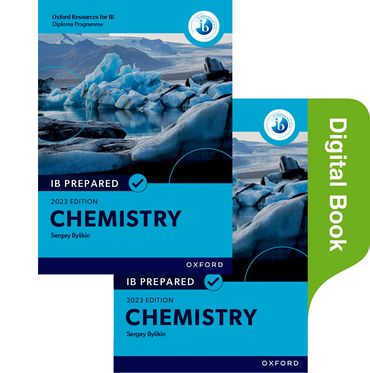Oxford Resources for IB Diploma Programme: IB Prepared: Chemistry 2023 Edition

Oxford Resources for IB Diploma Programme: IB Prepared: Chemistry 2023 Edition
|
ISBN: |
9781382058353 |
|
Binding: |
Paperback + CD |
|
Published: |
29 Apr 2025 |
|
Availability: |
58
|
|
Series: |
$82.95 AUD
$93.99 NZD
Add To CartDescription
Exam Board: International Baccalaureate
Level and subject: Diploma Programme Chemistry
First teaching: 2023
First exams: 2025
IB Prepared resources are developed directly with the IB to provide the most up-to-date, authentic and authoritative guidance on DP assessment. IB Prepared: Chemistry 2023 edition combines a concise review of course content with strategic guidance, past paper material and exam-style practice opportunities, allowing learners to consolidate the knowledge and skills that are essential to success.
This book is accompanied by a digital version, which you can access on our digital learning platform Kerboodle via the unique access code enclosed in your print book
Contents
Contents
Introduction
Structure 1 — Models of the particulate nature of matter
1.1 Introduction to the particulate nature of matter
1.2 The nuclear atom
1.3 Electron configurations
1.4 The mole concept
1.5 Ideal gases
Structure 2 — Models of bonding and structure
2.1 The ionic model
2.2 The covalent model
2.3 The metallic model
2.4 From models to materials
Structure 3 — Classification of matter
3.1 The periodic table: Classification of elements
3.2 Functional groups: Classification of organic compounds
Reactivity 1 — What drives chemical reactions?
1.1 Measuring enthalpy changes
1.2 Energy cycles in reactions
1.3 Energy from fuels
1.4 Entropy and spontaneity
Reactivity 2 — How much, how fast and how far?
2.1 How much? The amount of chemical change
2.2 How fast? The rate of chemical change
2.3 How far? The extent of chemical change
Reactivity 3 — What are the mechanisms of chemical change?
3.1 Proton transfer reactions
3.2 Electron transfer reactions
3.3 Electron sharing reactions
3.4 Electron-pair sharing reactions
Tool 1 — Experimental techniques
1.1 Addressing safety of self, others and the environment
1.2 Measuring variables
1.3 Applying techniques
Tool 2 — Technology
2.1 Applying technology to collect data
2.2 Applying technology to process data
Tool 3 — Mathematics
3.1 Applying general mathematics
3.2 Using units, symbols and numerical values
3.3 Processing uncertainties
3.4 Graphing
Internal Assessment (IA)
Practice Exam Papers
Index
Authors
Author Sergey Bylikin
Sample Pages
Reactivity 1 — What drives chemical reactions?
1.1 Measuring enthalpy changes